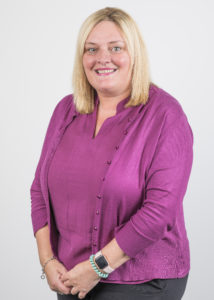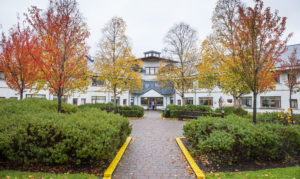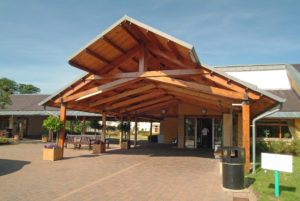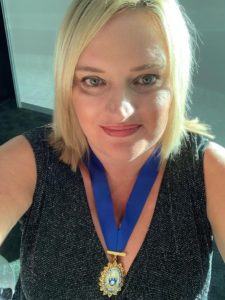 Pauline McIntyre is Deputy Director of Care at Erskine Home in Bishopton. She is one of 20 community nurses undertaking the Queen’s Nurse Development Programme during 2019 – the third year the programme has been running. She was also recently awarded the RCN Award of Merit.
Pauline McIntyre is Deputy Director of Care at Erskine Home in Bishopton. She is one of 20 community nurses undertaking the Queen’s Nurse Development Programme during 2019 – the third year the programme has been running. She was also recently awarded the RCN Award of Merit.
Here, Pauline shares her experience of working as a care home nurse.
In 2003, after 16 years in the NHS I decided on a career change. A position became available in Erskine, a charity caring for ex-service men and women. When I informed my line manager that I was offered the position as Response Sister, the reply was that I was going to “nothing more than a care home to wash and dress people” and she expressed the opinion that I would “lose all my skills“. Have you heard this said? Have you thought this when you hear about nursing in care homes?
In this, my first blog, I would like to share with you my care home nursing journey.
In the first few weeks I could easily have returned to the security of the NHS. There was no doctor on site to discuss resident care, to examine and review the resident, to prescribe and change treatments. I will never forget the first time I saw a Medicine Administration Record (MAR) sheet and compared this with the hospital Kardex that I was familiar with. However, this was change, a change that involved understanding new practices and procedures.
Initially employed as Response Sister for 180 residents and the staff on duty, my prior experience certainly helped me to deal with care delivery, staffing and environmental situations.
Within the first year I was promoted to House Manager for thirty residents and forty staff. In this role I developed my leadership and management skills, influencing changes to support the delivery of high standards of care.

The Erskine Home
In 2007, I embarked on a different role as Practice Development Nurse. I was keen to share best practice with staff across Erskine’s five homes in a variety of ways mainly by supporting staff on the care floor, delivering training and leading on audit. In 2008, I successfully completed training to become a Royal College of Nursing (RCN) Steward and Learning Representative, before venturing into Clinical Governance and Quality Improvement in 2012.
Over the years, the resident population has changed dramatically. People are cared for longer in their own home before moving in to the care home, often with multiple long term health conditions, complex in nature. Many live with physical disabilities and over half will be living with a cognitive impairment or dementia.
Care homes are one of the greatest experiences you will have, teaching you about people and about relationships. We must never forget that care is at the heart of being a nurse, other more manual (technical) skills, while important, are subordinate to being caring – with people at the core of everything we do. The scope of nursing practice that is needed is diverse, frequently delivered autonomously, while liaising with many other health and social care professionals.
A Registered Nurse in Erskine will often be in charge of the house they are based in. The role is to ensure the quality of care across the whole shift, to promote resident wellbeing while recognising when someone is deteriorating and intervening timeously, at the same time being responsible for the deployment of the staff that day, dealing with medicine prescriptions and administrations, all of this without several other nurses and doctors to call on when someone is becoming ill.

The Erskine Home
Nurses will be talking to residents, learning about them – establishing what and who matters to them, what distresses them, what are their wishes around end of life and develop a shared anticipatory care plan. It is vital to build good relationships with residents, family members, staff and others to maintain a person – and relationship – centred approach to care, recognising that the care home is the resident’s home as well as the place where care is delivered. So far from being an unskilled or deskilling role it is a role that requires the nurse to multitask continuously, to make complex decisions, to role model their professionalism, their personality-centred values and beliefs and exhibit the range of nursing knowledge.
We use digital records, our care plans are digital, our progress notes are digital our medication system is digital. We use desktop PCs, we use laptops, tablets and mobile phones to record resident interactions, their activities, the richness of their day, and to record when they are becoming unwell and the actions taken. In two of our homes we use a digital system to refer to our own Advanced Nurse Practitioner who triages referrals, dealing with most requests, only sending on to the GPs things that need GP input (e.g. complex medication issues, capacity assessments etc).
Our Dementia Nurse Consultant, delivers training based on Promoting Excellence, including clinical and frailty simulation training. Our Practice Development Nurse supports and develops best practice, working alongside our teams, our Trainee Advanced Nurse Practitioner is following the national transforming nursing roles pathway. Quality improvement is embedded in our day to day work with the support of the QI Team.
Yes I am proud to share with you that I work and support staff in specialist roles who are highly skilled and supported to further develop their skills. As care home nurses we have in-depth knowledge of long term conditions associated with ageing, manage complex multiple morbidities and frailty.
I quickly adapted to the differences working in a care home and I am pleased to share with you I stayed! I have had an incredible journey and held a variety of roles and since 2018 as Erskine’s Deputy Director of Care.
 In May 2019, I was honoured for my role as RCN Steward and Learning Representative and presented with RCN Award of Merit – celebrating the very best in nursing. It is the highest honour the RCN bestows for service and is presented to those who have made an exceptional contribution to the Royal College and have shown outstanding commitment and support to members. In recognition of dedication and leadership, knowledge and experience, integrity and tenacity. It has been a privilege to support colleagues, residents and their families.
In May 2019, I was honoured for my role as RCN Steward and Learning Representative and presented with RCN Award of Merit – celebrating the very best in nursing. It is the highest honour the RCN bestows for service and is presented to those who have made an exceptional contribution to the Royal College and have shown outstanding commitment and support to members. In recognition of dedication and leadership, knowledge and experience, integrity and tenacity. It has been a privilege to support colleagues, residents and their families.
2019 was also a very special year for me as I was thrilled to be selected to be on the Queen’s Nursing Institute Scotland’s Queen’s Nurse programme. One of only twenty community nurse selected this year to participate in this personal/professional development process.
So, those voices that say you will lose all your skills working in a care home? Far, far from it. I have shown the variety of nursing roles available in care home nursing and the many opportunities there are to develop and gain new skills.